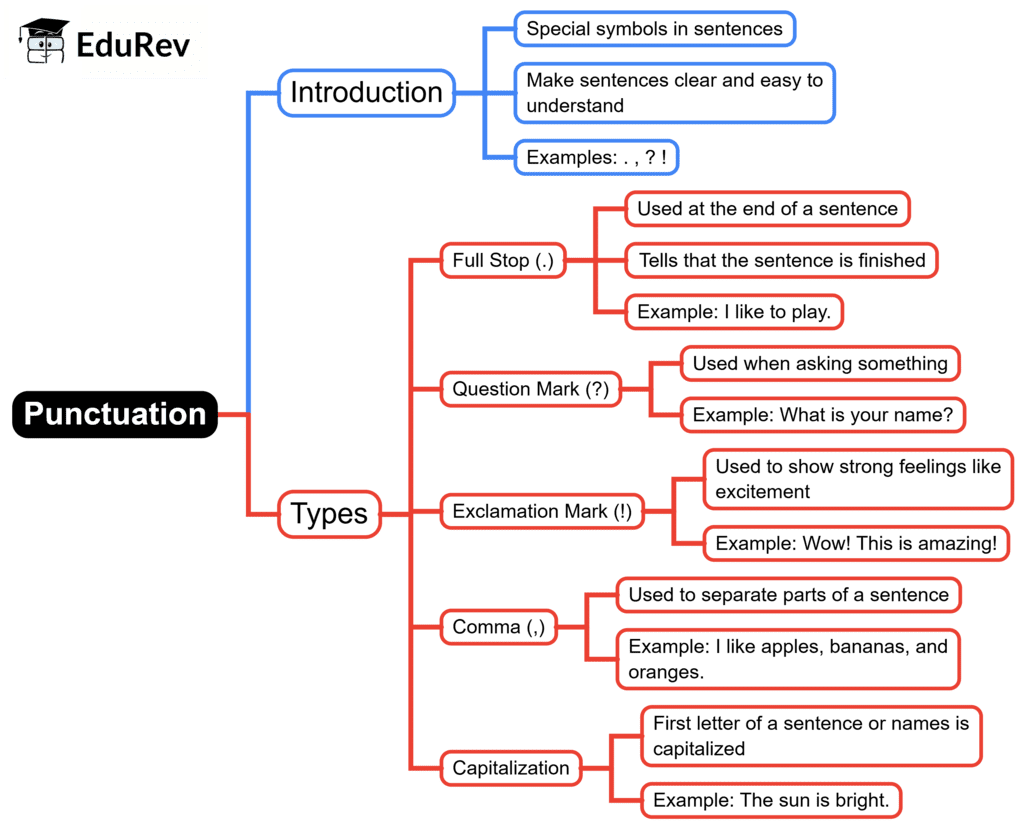Class 1 Exam > Class 1 Notes > English Grammar for Junior Classes > Mind Map: Punctuation
Mind Map: Punctuation | English Grammar for Junior Classes - Class 1 PDF Download

The document Mind Map: Punctuation | English Grammar for Junior Classes - Class 1 is a part of the Class 1 Course English Grammar for Junior Classes.
All you need of Class 1 at this link: Class 1
|
18 videos|287 docs|31 tests
|
FAQs on Mind Map: Punctuation - English Grammar for Junior Classes - Class 1
| 1. What are the basic functions of punctuation in writing? |  |
Ans.Punctuation serves several essential functions in writing, including indicating pauses, clarifying meaning, and separating ideas. It helps to structure sentences, making them easier to read and understand. For example, commas indicate a brief pause, while periods signal the end of a thought. Additionally, punctuation marks like question marks and exclamation points convey tone and emotion, enhancing the overall communication of the text.
| 2. Why is proper punctuation important in academic writing? |  |
Ans.Proper punctuation is crucial in academic writing because it ensures clarity and precision. Incorrect punctuation can lead to misunderstandings and ambiguities, potentially altering the intended meaning of a statement. In academic contexts, where arguments and evidence must be presented clearly, correct punctuation helps maintain professionalism and credibility in the writing.
| 3. How does punctuation affect the readability of a text? |  |
Ans.Punctuation significantly affects the readability of a text by guiding the reader through the flow of ideas. Well-placed punctuation marks help to break up long sentences, create natural pauses, and indicate the relationships between different parts of the text. This structured approach allows readers to follow arguments more easily and enhances their overall comprehension of the material.
| 4. What are some common punctuation mistakes to avoid? |  |
Ans.Common punctuation mistakes include misuse of commas, such as omitting them in compound sentences or using them incorrectly in lists. Other frequent errors involve the incorrect use of apostrophes, particularly in plural forms, and confusion between periods and commas in complex sentences. Being aware of these pitfalls can improve writing quality and prevent miscommunication.
| 5. How can one improve their punctuation skills? |  |
Ans.Improving punctuation skills can be achieved through practice and study. Reading widely can expose individuals to correct punctuation use in various contexts. Additionally, writing regularly and seeking feedback can help identify and correct punctuation errors. Utilizing grammar guides and online resources can also provide valuable insights and exercises to enhance one's punctuation proficiency.
Related Searches





















